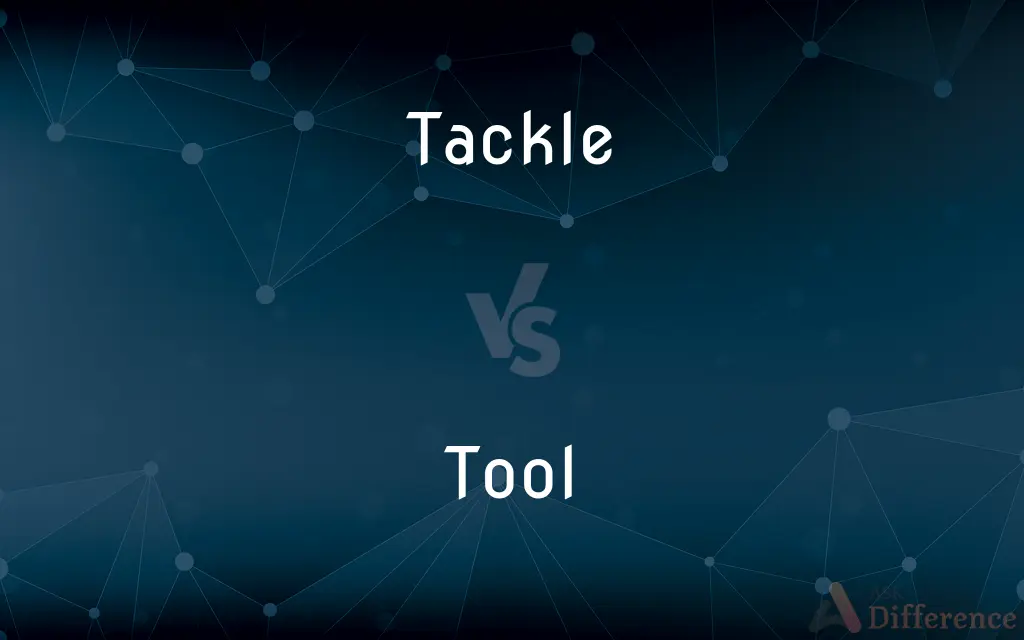Tackle vs. Tool — What's the Difference?
By Fiza Rafique & Urooj Arif — Updated on February 29, 2024
Tackle refers to equipment or apparatus used for a specific activity, related to fishing, whereas a tool is a device or implement, typically handheld, used to carry out a particular function, especially in tasks requiring manual operation or precision.

Difference Between Tackle and Tool
Table of Contents
ADVERTISEMENT
Key Differences
Tackle is a term most commonly associated with fishing, where it encompasses items such as rods, reels, lines, hooks, and lures equipment designed for catching fish. Tools, on the other hand, are devices or implements used to perform tasks. They can range from simple manual instruments like hammers and screwdrivers to more complex machinery like power drills and saws.
The concept of tackle can extend to other activities as well, implying the gear or apparatus specific to that activity, focusing on the assembly of items needed for a particular purpose. Tools are characterized by their utility in construction, repair, creation, or modification processes, involving physical manipulation to achieve a desired outcome.
Both tackle and tools are essential for accomplishing tasks, their usage context distinguishes them. Tackle is specialized and activity-specific, often used in recreational or professional pursuits like fishing, whereas tools have a broader application across various industries, crafts, and DIY activities, serving functional purposes in building, repairing, or crafting.
The choice between the terms reflects the nature of the activity and the items in question. For instance, assembling a fishing rod with its accessories is preparing one's tackle, while using a wrench to tighten a bolt involves using a tool. This distinction highlights the specialized nature of tackle against the more universally applicable concept of tools.
All tackle can be considered tools in the broader sense of facilitating tasks, not all tools are tackle, as the latter term implies a narrower scope tied to specific activities. The importance of both lies in their ability to enable humans to perform tasks more efficiently and effectively, leveraging mechanical advantages or specialized designs.
ADVERTISEMENT
Comparison Chart
Definition
Equipment or apparatus used for specific activities, especially fishing.
A device or implement, often handheld, used to carry out a particular function.
Usage Context
Primarily associated with fishing, but can extend to other specific activities.
Broad application across various industries, including construction, repair, and crafts.
Examples
Fishing rods, reels, lines, hooks, lures.
Hammers, screwdrivers, saws, drills.
Purpose
To facilitate specific recreational or professional activities.
To perform tasks requiring physical manipulation, construction, or repair.
Nature
Specialized and activity-specific.
Universal, serving functional purposes across multiple domains.
Compare with Definitions
Tackle
Items assembled for engaging in a recreational activity.
The climber's tackle included ropes and carabiners.
Tool
Equipment used in fishing, like rods and reels.
He organized his tackle before heading out to the lake.
Tackle
Equipment used in fishing, like rods and reels.
He organized his tackle before heading out to the lake.
Tool
A set of tools or equipment designed for a particular sport or hobby.
Her sailing tackle was ready for the regatta.
Tackle
Gear specific to an activity, facilitating its execution.
The team checked their tackle before the game.
Tool
Apparatus or gear used in pursuing a specific endeavor.
His kitesurfing tackle was state-of-the-art.
Tackle
Apparatus or gear used in pursuing a specific endeavor.
His kitesurfing tackle was state-of-the-art.
Tool
Items assembled for engaging in a recreational activity.
The climber's tackle included ropes and carabiners.
Tackle
A set of tools or equipment designed for a particular sport or hobby.
Her sailing tackle was ready for the regatta.
Tool
A tool is an object that can extend an individual's ability to modify features of the surrounding environment. Although many animals use simple tools, only human beings, whose use of stone tools dates back hundreds of millennia, have been observed using tools to make other tools.
Tackle
The equipment used in a particular activity, especially in fishing; gear.
Tool
Gear specific to an activity, facilitating its execution.
The team checked their tackle before the game.
Tackle
(often tākəl) Nautical A system of ropes and blocks for raising and lowering weights of rigging and pulleys for applying tension.
Tool
A device or implement, especially one held in the hand, used to carry out a particular function
Gardening tools
Tackle
A rope and its pulley.
Tool
A device, such as a saw, shovel, or drill, used to perform or facilitate manual or mechanical work.
Tackle
The act of stopping an opposing player carrying the ball, especially by forcing the opponent to the ground, as in football or rugby.
Tool
A machine, such as a lathe, used to cut and shape machine parts or other objects.
Tackle
The act of obstructing a player in order to cause loss of possession of the ball, as in soccer.
Tool
An instrument such as a hammer, saw, plane, file, and the like, used in the manual arts, to facilitate mechanical operations; any instrument used by a craftsman or laborer at his work; an implement; as, the tools of a joiner, smith, shoe-maker, etc.; also, a cutter, chisel, or other part of an instrument or machine that dresses work.
Tackle
To engage or deal with
Tackle a perplexing problem.
Tool
Furnish with tools
Tackle
Apparatus for raising or lowering heavy weights, consisting of a rope and pulley blocks; sometimes, the rope and attachments, as distinct from the block, in which case the full appratus is referred to as a block and tackle.
Tool
Work with a tool
Tackle
To fasten or attach, as with a tackle; to harness; as, to tackle a horse into a coach or wagon.
Tackle
To seize; to lay hold of; to grapple; as, a wrestler tackles his antagonist; a dog tackles the game.
The greatest poetess of our day has wasted her time and strength in tackling windmills under conditions the most fitted to insure her defeat.
Tackle
A position on the line of scrimmage;
It takes a big man to play tackle
Tackle
Seize and throw down an opponent player, who usually carries the ball
Common Curiosities
Can tackle include non-physical items?
Tackle typically refers to physical items, though in a broader sense, it might include knowledge or techniques specific to an activity.
How has technology impacted the development of tools and tackle?
Technology has led to more advanced, efficient, and sometimes automated tools and tackle, enhancing effectiveness and accessibility.
Can a tool be considered tackle?
A tool can be considered tackle if it's specifically used for activities like fishing, where the term tackle is applicable.
What role do tools and tackle play in hobbyist activities?
For hobbyists, tools and tackle not only facilitate the activity but also enhance the enjoyment and skill level involved in their hobbies.
Is specialized knowledge required to use tackle or tools?
While basic tools can be intuitive, both tackle and specialized tools often require specific knowledge or skills for effective use.
How do professionals choose their tools or tackle?
Professionals choose tools or tackle based on the specific requirements of their task, considering factors like efficiency, precision, and suitability.
Are all fishing items considered tackle?
Most items directly involved in the act of fishing, such as rods, lines, and nets, are considered tackle.
Are there any safety concerns associated with using tools and tackle?
Yes, improper use of tools and tackle can lead to injuries, emphasizing the need for appropriate safety measures and training.
How do environmental considerations affect the use of tools and tackle?
Environmental considerations may influence the choice of materials, energy efficiency, and disposal methods of tools and tackle to minimize ecological impact.
Can the same item be both a tool and tackle?
Yes, an item can be both if it serves a general function as a tool and is also used specifically within the context of an activity classified under tackle.
Share Your Discovery

Previous Comparison
Southwards vs. Southward
Next Comparison
Lessen vs. LowerAuthor Spotlight
Written by
Fiza RafiqueFiza Rafique is a skilled content writer at AskDifference.com, where she meticulously refines and enhances written pieces. Drawing from her vast editorial expertise, Fiza ensures clarity, accuracy, and precision in every article. Passionate about language, she continually seeks to elevate the quality of content for readers worldwide.
Co-written by
Urooj ArifUrooj is a skilled content writer at Ask Difference, known for her exceptional ability to simplify complex topics into engaging and informative content. With a passion for research and a flair for clear, concise writing, she consistently delivers articles that resonate with our diverse audience.














































